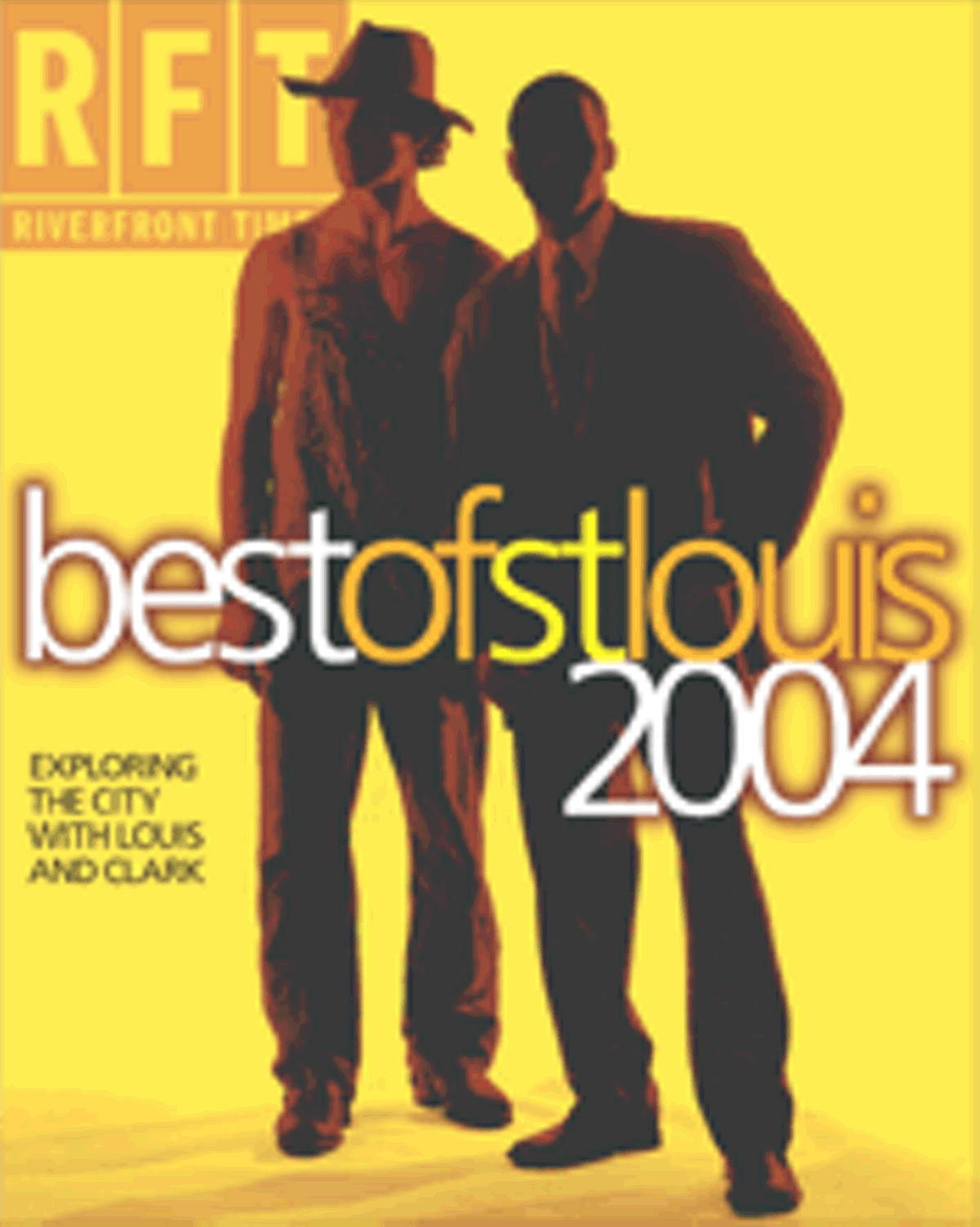Given the depth of the local blues talent pool, there are plenty of plausible contenders for this category, from revered elder statesmen to hardworking, talented younger players. Bennie Smith represents the best of both worlds. He's a veteran musician with a rich history who still gets out and works around town nearly every week. His idiosyncratic guitar style and expressive vocals have kept him busy playing the blues for close to half a century now, and along the way he's been a mentor to several generations of aspiring St. Louis musicians. If Bennie Smith were a building, he'd be a historic landmark. Appropriately, he recently received a mayoral proclamation honoring his accomplishments as an artist and his contributions to the St. Louis music community. As for the rest of us, the best way to recognize Smith's greatness would be to simply listen and enjoy it.
You may not even realize that you know Kim Humphries. He's the "kh" who posts all the "calls for artists" on the Critical Mass listserv. He's also president of Critical Mass itself, the organization that promotes art and artists in St. Louis. And he's a project manager at Arts in Transit, working to bring more public art to the region. He mostly shows his work at the funkier venues, places like Mad Art and Fort Gondo, but in July he exhibited at the Contemporary Art Museum St. Louis as one of three recipients of the Great Rivers Biennial award. Humphries is a rarity in the art world: a selfless artist who works just as hard for the local art scene as he does on his own art. Which, by the way, is fabulous -- Humphries specializes in thoughtful, funny installations of pieces of cast-off culture, culled from estate sales and auctions. As an artist, he's definitely going places. Let's hope he stays in St. Louis.
You may not even realize that you know Kim Humphries. He's the "kh" who posts all the "calls for artists" on the Critical Mass listserv. He's also president of Critical Mass itself, the organization that promotes art and artists in St. Louis. And he's a project manager at Arts in Transit, working to bring more public art to the region. He mostly shows his work at the funkier venues, places like Mad Art and Fort Gondo, but in July he exhibited at the Contemporary Art Museum St. Louis as one of three recipients of the Great Rivers Biennial award. Humphries is a rarity in the art world: a selfless artist who works just as hard for the local art scene as he does on his own art. Which, by the way, is fabulous -- Humphries specializes in thoughtful, funny installations of pieces of cast-off culture, culled from estate sales and auctions. As an artist, he's definitely going places. Let's hope he stays in St. Louis.
In case you didn't notice, 2004 is a big anniversary year around here, what with Lewis, Clark and the World's Fair ice cream cone and all. And if there's one thing St. Louisans like to do, it's commemorate an occasion with music. Case in point, St. Louis 2004's River Splash concert series on the Arch grounds. This six-week summer festival, booked by Contemporary Productions, brought a giant water-projection screen and big-name acts from across the music spectrum, from Lyle Lovett to Paul Oakenfold, the B-52's to B.B. King, Liz Phair to the Neville Brothers, Wyclef Jean to Los Lobos. Talk about versatile appeal! And keep in mind: These shows were free. We're talking 300,000 attendees (25,000 at the B.B. King show alone!) enjoying those economics. Given that 2004 only comes around once, it's nice to know we've got something great to mark down in the history books. Kudos to the City of St. Louis, St. Louis 2004 and the hotshot local sponsors for staging such a terrific six-week party. The only question is: Can they pull it off again?
So many throwdowns to choose from, in this, the most exciting St. Louis musical moment in at least 40 years. In 2003 and '04, Chingy, J-Kwon, Murphy Lee and (of course) Nelly bombarded the charts. The resulting coverage did wonders for St. Louis' national image, with Rolling Stone, The New Yorker, Billboard and others coming to the local party. The four, and their dueling pairs of genius producers, the TrackBoyz and the Trak Starz, have the sizzle. The Starz hit with Chingy: "Right Thurr," "Holidae In" and "One Call Away." The Boyz responded with J-Kwon's grand romp "Tipsy." Murphy did it with "What da Hook Gon Be?" and Nelly -- accompanied by P. Diddy and Murph -- with "Shake Ya Tailfeather." But the best was "Holidae In," Chingy's ode to getting drunk, stoned and laid in a hotel room with Snoop Dog, Ludacris and at least eight ladies. The Trak Starz' hollow thump of a beat is great, and the lyrics -- dumb, yes, but this is pop music. "There's three girls on the elevator like, 'Wassup?'/I told 'em, 'Follow me,' they knew I had it cracking, B/One said, 'Ain't you that boy that be on BET?'/ "'Yeah, that's me, Ching-a-ling, equipped wit' much ding-a-ling.'" Let the party begin, indeed.
Did you know a poetry-loving Chinese detective walks among us? Well, not really. But we do rub elbows with the creator of fictional sleuth Chen Cao: Qiu Xiaolong. The Shanghai native came to Mound City in 1988 on a Ford Foundation grant to study at Washington University. He's been here ever since, writing, translating and teaching. So far Qiu has penned three outings for Inspector Chen: Death of a Red Heroine (2001), A Loyal Character Dancer (2003) and When Red is Black, published earlier this year. The mystery series is enhanced with delicious details of intricately prepared exotic dishes, Eastern poetry and Buddhist and Confucian wisdom. But what really sets Qiu's novels apart is their nuanced exploration of Chinese political conflict. While the author's characters are extremely distrustful of the Maoist propaganda that still pervades modern times, they're also skeptical of Shanghai's capitalist influx. It's that kind of Zeitgeist-consciousness that elevates the crime genre from pulp to primo fiction, and it's a rare commodity indeed.
Did you know a poetry-loving Chinese detective walks among us? Well, not really. But we do rub elbows with the creator of fictional sleuth Chen Cao: Qiu Xiaolong. The Shanghai native came to Mound City in 1988 on a Ford Foundation grant to study at Washington University. He's been here ever since, writing, translating and teaching. So far Qiu has penned three outings for Inspector Chen: Death of a Red Heroine (2001), A Loyal Character Dancer (2003) and When Red is Black, published earlier this year. The mystery series is enhanced with delicious details of intricately prepared exotic dishes, Eastern poetry and Buddhist and Confucian wisdom. But what really sets Qiu's novels apart is their nuanced exploration of Chinese political conflict. While the author's characters are extremely distrustful of the Maoist propaganda that still pervades modern times, they're also skeptical of Shanghai's capitalist influx. It's that kind of Zeitgeist-consciousness that elevates the crime genre from pulp to primo fiction, and it's a rare commodity indeed.
Cast away your aspersions: Julia Sets have arrived. They're veterans of the St. Louis scene, playing their Midwestern brand of garage rock to small, devoted crowds. But it wasn't until the release of Yes-Wave that they truly cemented their position as one of the more formidable local rock bands. They did it quite simply, too, with resonant guitar and vocals courtesy of James Weber Jr., Black-Deal harmonies provided by bassist Kate Eddens, and Kris Boettigheimer underlining the story on drums. The influences are clear: a lot of Replacements, a lot of Farrar and Tweedy, a little Springsteen and a little more Neil Young. But they manage to clear the hurdle that trips so many other bands with such noticeable and notable stimuli: They don't sound like any of their forebears. These are people who came of age in the '80s, people who know what it's like to see in black and white, people who would rather be art than think about it. That's exactly how Yes-Wave sounds, thanks to Weber's focus. He is a songwriter, and he at last proves it here. He writes songs about love and loss and plain living, sharpening all of life's dull edges until you feel you might scrape yourself if you rub up too close.
An associate professor in English and African and Afro-American Studies at Washington University, Carl Phillips is the author of four books of poetry. The latest, The Rest of Love, published this year, follows in the footsteps of Phillips' previous (multiple award-nominated) work, melding the rhythms of classical poetry with the sensibility of a modern African-American man. Unlike too many of today's poets, to Phillips meaning is important, and every word of his sparsely composed verse rings with it. Phillips is also a presence when reading his work, making the distinction between poet and performer inconsequential.
An associate professor in English and African and Afro-American Studies at Washington University, Carl Phillips is the author of four books of poetry. The latest, The Rest of Love, published this year, follows in the footsteps of Phillips' previous (multiple award-nominated) work, melding the rhythms of classical poetry with the sensibility of a modern African-American man. Unlike too many of today's poets, to Phillips meaning is important, and every word of his sparsely composed verse rings with it. Phillips is also a presence when reading his work, making the distinction between poet and performer inconsequential.
Go ahead, make the requisite joke about the "captive audience." Then acknowledge the fact that prison arts and education programs cut recividism rates. And that nevertheless, state and federal governments keep cutting funding for arts and education in prisons. Fourteen years ago, Agnes Wilcox began an arts-outreach program to St. Louis prisons and juvenile-detention facilities. Nowadays, as artistic director of Prison Performing Arts, she works with at least five institutions statewide, bringing in a variety of performing artists and providing classes and performance opportunities. Last year at Bowling Green, male inmates performed The Gospel at Colonus, while women in Vandalia undertook Act One of Macbeth. Wilcox, meanwhile, forges ahead, working on an after-school program for teens. Though all her grant applications for the new program have so far been unsuccessful, Wilcox shrugs and says, "We'll keep applying. It needs to happen. It will happen." To contact Prison Performing Arts, address mail to 630 Trinity Avenue, University City, MO 63130, call 314-727-5355 or visit www.prisonartsstl.org. Donations are tax-deductible.






